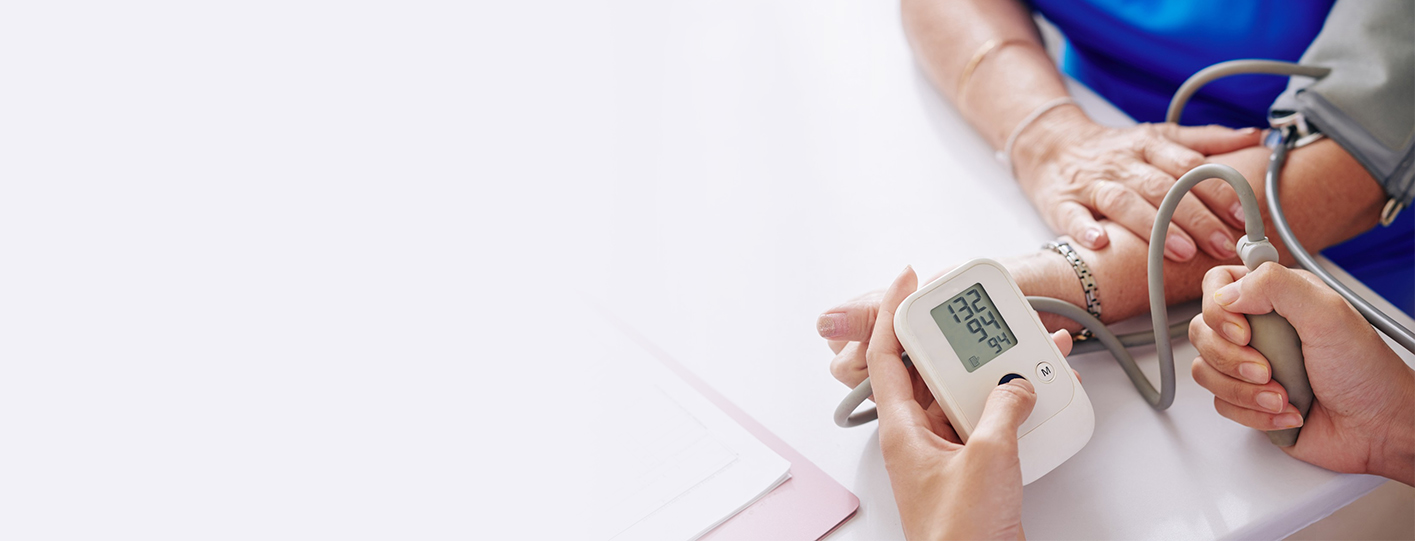



High blood pressure occurs when the pressure of the blood against your arteries' walls is constantly too high. It is a condition of having a blood pressure reading higher than 130/80 mmHg. A reading of 130/80 mmHg or higher means your heart is pumping too hard, and this, in turn, can put a strain on your heart over time and result in severe complications.
High blood pressure puts significant strain on the heart, leading to various cardiovascular complications. An increased heart rate forces the heart to work harder to pump blood, which can cause heart enlargement and weaken the heart muscle over time, increasing the risk of heart failure.
Arterial damage occurs as elevated blood pressure exerts excessive force on arterial walls, causing them to stiffen and lose elasticity. This damage raises the risk of atherosclerosis, a condition where arteries harden and narrow, potentially leading to heart disease and stroke.
Heart attacks may occur when high blood pressure promotes plaque buildup in the arteries; if a plaque ruptures, a blood clot can form, blocking blood flow and triggering an attack. Long-term high blood pressure also thickens and stiffens the heart muscle, making it harder to pump blood efficiently, which can eventually cause heart failure.
Persistent high blood pressure weakens blood vessels, increasing the likelihood of developing an aneurysm, a bulging, weakened area that can rupture and cause life-threatening internal bleeding. Managing blood pressure is crucial to reducing these risks and protecting overall heart health.
While high blood pressure can cause serious damage, the good news is that it can be controlled. Making lifestyle changes, managing stress, and in some cases, using medication can help keep high blood pressure under control and reduce the risk of heart-related complications.
In some cases, lifestyle changes alone may not be enough. Your cardiologist may recommend medications such as:
Always work with your doctor to monitor your blood pressure and adjust medications as needed.
Chronic stress can contribute to high blood pressure. Stress reduction techniques such as meditation, yoga, deep breathing exercises, and mindfulness can be helpful in controlling blood pressure.
While there is no quick "cure" for high blood pressure, you can employ relaxation techniques in moments of high stress to lower your blood pressure temporarily:
While these techniques may provide immediate relief, long-term control of high blood pressure requires consistent lifestyle changes and possibly medication.
Regular monitoring of your blood pressure is crucial for managing hypertension. Home blood pressure monitors are easily available and can help you track your levels over time. This allows you to understand how your lifestyle changes and medication are impacting your blood pressure and make necessary adjustments.
High blood pressure is a silent condition that can gradually damage your heart and blood vessels, leading to severe complications like heart attacks, strokes, and heart failure. However, by adopting a healthy lifestyle, reducing stress, and following your doctor's recommendations, you can effectively manage high blood pressure and protect your heart.
If you’re experiencing high blood pressure symptoms like headaches, dizziness, or shortness of breath, it’s important to consult with your cardiologist. With the right approach, you can control high blood pressure and live a long, healthy life. Your heart is your most vital organ—take care of it!
Q1: What is considered High Blood pressure ?
A: Blood pressure 130/80 mmHg or Higher is considered high. Normal is around 120/80 mmHg.
Q2: What are the warning signs of High blood pressure ?
A: Usually no symptoms, but severe cases may cause Headaches, Dizziness, Blurred vision, Chest pain, or breathlessness.
Q3: How does High Blood pressure damage the Heart ?
A: It causes heart enlargement, artery damage, heart attacks, heart failure, and aneurysms by overworking the heart.
Q4: Can High Blood pressure be cured ?
A: It cannot be cured but can be controlled with lifestyle changes, medication, and stress management.
Q5: What foods should I avoid if I have High blood pressure ?
A: Avoid salt, sugar, fried foods, processed foods, alcohol, and excess caffeine.
Q6: How can I lower my Blood pressure naturally ?
A: Exercise, eat a low-sodium diet, manage stress, quit smoking, and limit alcohol.
Q7: Is High blood pressure hereditary ?
A: Yes, it can be genetic, but a healthy lifestyle helps reduce the risk.
Q8: How often should I check my blood pressure ?
A: At least once a week if you're at risk or diagnosed, and during regular doctor visits.
Q9: Can stress cause High blood pressure ?
A: Yes, chronic Stress raises blood pressure and promotes unhealthy habits.
Q10: When should I see a doctor for High blood pressure ?
A: If its 130/80 mmHg or higher or you have Headaches, Chest pain, Dizziness, or blurred vision.
From Recent Advancements in Heart Care to Tips and Tricks to make your Heart Healthy Again, stay updated with reliable and informative blogs by our experts.